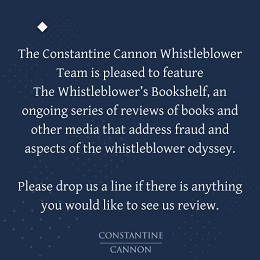Book Review: “Empire of Pain: The Secret History of the Sackler Dynasty,” by Patrick Radden Keefe

Last October, Purdue Pharma, the inventor, manufacturer, and marketer of Oxycontin, the drug at the center of the opioid crisis, reached a massive healthcare fraud settlement with the Department of Justice. The Department advertised the settlement as an $8.3 billion dollar recovery, which would make it one of the largest healthcare fraud settlements in history. In his book Empire of Pain, Patrick Radden Keefe explores the history of the Sacklers, the family that owns, and has been made fabulously wealthy through, Purdue Pharma and the sale of Oxycontin.
 The Sackler family’s history is intertwined with the modern pharmaceutical industry. The eldest of the three brothers who bought Purdue in the 1950s, functionally invented modern pharmaceutical marketing. Arthur Sackler, who also owned an advertising agency, pioneered the marketing of drugs directly to physicians. Or as the Medical Advertising Hall of Fame put it: “No single individual did more to shape the character of medical advertising than the multi-talented Dr. Arthur Sackler. His seminal contribution was bringing the full power of advertising and promotion to pharmaceutical marketing.”
The Sackler family’s history is intertwined with the modern pharmaceutical industry. The eldest of the three brothers who bought Purdue in the 1950s, functionally invented modern pharmaceutical marketing. Arthur Sackler, who also owned an advertising agency, pioneered the marketing of drugs directly to physicians. Or as the Medical Advertising Hall of Fame put it: “No single individual did more to shape the character of medical advertising than the multi-talented Dr. Arthur Sackler. His seminal contribution was bringing the full power of advertising and promotion to pharmaceutical marketing.”
Arthur Sackler’s creative methods propelled Valium, an early benzodiazepine used to treat, amongst many things, anxiety disorders, to be the first drug to generate over $100 million in sales. And though his career included many allegations of impropriety, including purported conflicts of interest and even alleged kickbacks to FDA officials, it made Arthur Sackler extremely wealthy. The lighter aspects of Empire of Pain explore what he did with that wealth, which included the funding of moving an ancient Egyptian temple from the Nile River Valley to New York’s Metropolitan Museum and co-funding the Smithsonian Museum of Asian Art, named after himself.
In 1995, eight years after Arthur Sackler’s death, Purdue Pharma, then headed by his nephew, Richard Sackler, brought Oxycontin to market. Oxycontin, like opium, morphine, or heroin, is derived as a way to channel the pain-killing power of the opium poppy. The plant’s use has been known to humanity for thousands of years, but what made Purdue’s formulation special was the “contin” time-release mechanism, According to the company, a single dose results in 12 hours of pain relief.
The drug turned the Sacklers from multi-millionaires to multi-billionaires. It also set off the nation’s opioid epidemic, which has officially killed nearly 500,000 Americans in the past 20 years. According to Keefe, Purdue, driven by greed, was responsible for this catastrophe in a few key ways. Most important were the misrepresentations about Oxycontin’s addictive properties, which, coupled with a very aggressive (and commission-based) sales strategy, led to salesmen targeting physicians who were willing to prescribe high, and frequent, doses of the drug, leading to patient addictions. Purdue was also accused of paying kickbacks to physicians to encourage them to proscribe additional, and higher, doses of Oxycontin. Those addicted patients then sought higher and higher doses of Oxycontin, which dove-tailed well with the company’s sales goals. Finally, once the drug got either too expensive or too hard to obtain, many of these patients turned to heroin. The amount of human suffering tied directly to this drug is impossible to quantify.
Keefe’s book also explores the details of enforcement actions against the company. Despite the reported $8.3 billion figure lauded by the Department of Justice last October, Purdue is in bankruptcy and the government is unlikely to recover anything near that amount. Members of the Sackler family allegedly extracted over $10 billion out of the company over the past several years. As part of the resolution, the Sackler family, in their individual capacity, agreed to pay $225 million (or just under 2% of their estimated $13 billion of wealth) to resolve allegations that they violated the False Claims Act.
Keefe recounts frequent anecdotes of individual prosecutors trying to hold the company, and the family, to account for ruining millions of lives. Purdue and the Sacklers, with their functionally infinite resources and white shoe law firms, reportedly pulled rank on these prosecutors, going over their heads to their Department of Justice superiors, and securing lighter, less stringent penalties, ensuring that the greed and the fraud paid off.
This saga has continued since the release of Keefe’s book in April. In Purdue’s bankruptcy proceedings, on June 2, 2021 the court found that the Sacklers’ financial disclosure statements were sufficiently transparent, overruling challenges that they were too secretive. Later this summer the more than 500,000 entities (individuals, state and local governments, other companies, etc.) suing Purdue will vote on a final settlement that will likely leave all members of the Sackler family immune from criminal prosecution and still filthy rich. A final resolution is expected by August 9, 2021.
Empire of Pain is an infuriating must-read for anyone interested in the histories of pharmaceutical marketing, the opioid crisis, and healthcare fraud. It’s also an extremely compelling human narrative. We highly recommend it to all our readers.
Read More:
- Healthcare & Pharmaceutical Fraud
- The Constantine Cannon Whistleblower Team
- Whistleblower Reward Laws
- Think you have a whistleblower case?
- Contact us for a confidential consultation
Tagged in: Importance of Whistleblowers, Pharma Fraud, Whistleblower Bookshelf,